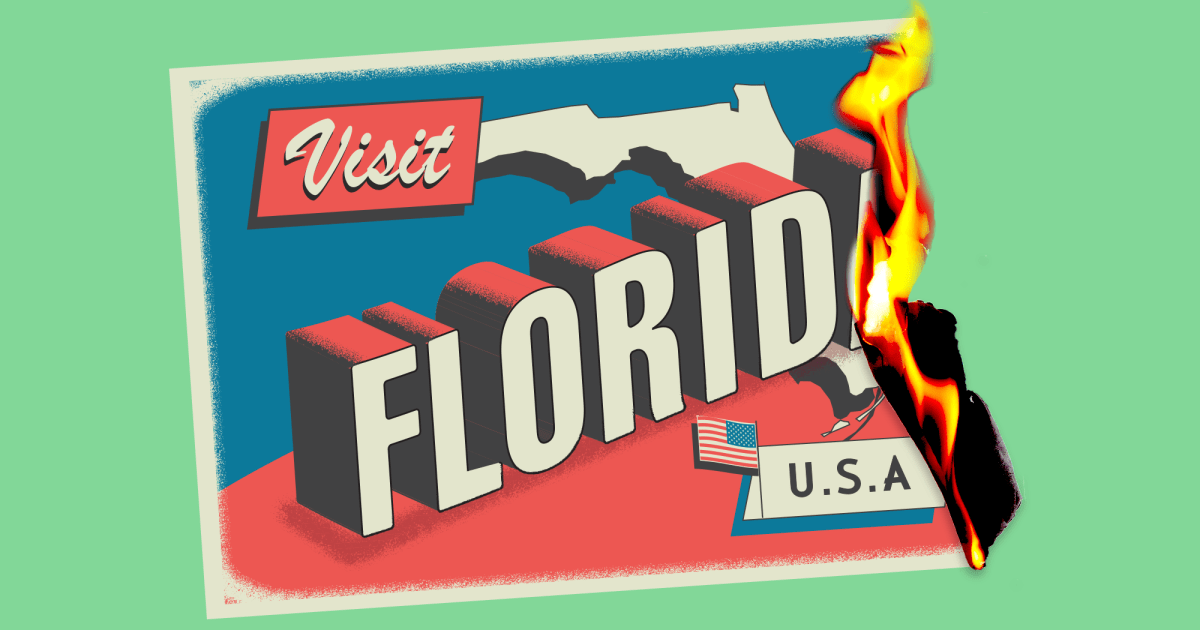At a recent event in Orlando, Florida Gov. Ron DeSantis brushed off reports that Canadians are increasingly not visiting the Sunshine State and pointed to his recent family trip to Legoland as evidence. “I’d say, like, 80 percent of them were Canadians,” DeSantis said, according to Orlando Weekly. “So, we’re going to continue to be a destination.”
Canadians are the largest proportion—nearly 28 percent—of international travelers visiting Florida and, according to the Canadian embassy, they also comprise the largest number of international visitors for the entire United States. But that comfortable relationship may be taking a turn. New tourism numbers for the first quarter of 2025 released by Visit Florida, a marketing organization that promotes tourism, show a dip in Canadian visitors of 3.4 percent.
Growing tensions between Canada and the US due to tariffs and rhetoric from the Trump administration about adopting Canada as the “51st state” have contributed to a shift in travel patterns between the two neighbors. Flights from Canada to South Florida have declined 20 percent compared to last year, the Miami Herald has reported. Visual Approach Analytics, an aviation data firm, found that Canadian travel had decreased by 20 percent at the Fort Lauderdale airport and 12 percent in Orlando’s airport between January and March, with predictions by some Canadian travel agents that the downward trend of travel not only to Florida but to the rest of the US will only continue.
Immediately after Donald Trump was reelected last November, McKenzie McMillan, a consultant with the Vancouver-based travel agency The Travel Group, says he heard rumblings from clients who were considering avoiding travel to the US. What was once ambivalence shifted dramatically in early February, after Trump threatened punishing tariffs and the annexation of Canada to become the 51st state. “We pretty much immediately started hearing feedback from clients,” he says. About 20 percent of spring break bookings to the US—including to destinations like San Diego, Los Angeles, Palm Springs, Las Vegas, and Phoenix— were canceled. Many chose to visit Mexico instead.
Stephanie Stella, owner of the travel agency Glow With Me Adventures, specializes in helping Canadians book trips to Disney parks in Florida and California, and this year, she too has seen cancellations from clients who “just either ethically or morally don’t feel right traveling to the States right now,” she says. “I just had a client email me to cancel a Disney World trip for September.” Since the start of the year, her agency has seen at least 20 cancellations for trips to parks in Florida and California.
“I just had a client email me to cancel a Disney World trip for September.”
Florida has always been the top travel destination for Micheline Robichaud’s clients at Adventure Away Travel Co. agency in Toronto. She notes that it may be difficult for Canadians to cancel trips that may be nonrefundable and suspects that the real impacts of the tension between Canada and the US will be seen at the end of 2025 into early 2026. Already, she has seen a 73 percent drop in Florida travel requests. One main reason? “They don’t want to economically support the US as a retaliatory measure to tariffs and a lot of the rhetoric that was coming out from certain political leaders in regards to the 51st state,” she says. “It caused a significant surge in patriotism in Canada.”
The decline in Canadian tourism isn’t restricted to Florida. US Customs and Border Protection data shows a 17.4 percent decrease in travelers entering from the northern border, Politifact reported. Canadian statistics from March also show 13.5 percent fewer Canadians returning on flights from the US when compared to the same time last year.
McMillan says about 60 percent of his agency’s business is tied to the United States, with California, Arizona, Texas, and Nevada among the most popular destinations. In recent years, when flights began between Vancouver and airports in Orlando and Miami, they saw an uptick in travel to Florida because many travelers board cruise ships from ports in the state.
So far this year, they’ve seen a 90 percent decrease in future bookings to the US. “We basically saw a complete collapse of that business,” McMillan says. Instead, Canadians are traveling to Europe and Asia, with many also opting to travel domestically to other provinces. What started as a protest against tariffs and protecting Canada’s sovereignty has now evolved into concerns about safety and the uncertainty of increased immigration enforcement. News of the 12-day detainment of a Canadian actress at the US-Mexico border intensified those fears, McMillan says. “Speaking as a travel adviser, but also as a Canadian, I’ve never seen a movement this strong in Canada, where consumers are so rapidly changing their habits and in such large numbers.”















